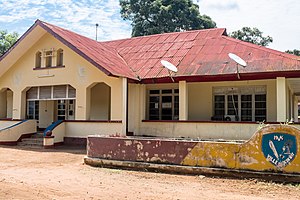Kikwit
This article needs additional citations for verification. (January 2010) |
Kikwit | |
|---|---|
| Ville de Kikwit | |
 The city hall of Kikwit | |
| Coordinates: 5°02′19″S 18°49′05″E / 5.03861°S 18.81806°E | |
| Country | |
| Province | Kwilu Province |
| City status | 1970 |
| Communes | Kazamba, Lukemi, Lukolela, Nzinda |
| Government | |
| • Mayor | Abe Ngiama[1] |
| Area | |
| • Urban | 92 km2 (36 sq mi) |
| Elevation | 452 m (1,483 ft) |
| Population (2017)[2] | |
| • City | 186,991 |
| • Urban | 458,000 |
| • Urban density | 5,000/km2 (13,000/sq mi) |
| Time zone | UTC+1 (West Africa Time) |
| Climate | Aw |
| National language | Kikongo ya leta |
Kikwit is the largest city of Kwilu Province, lying on the Kwilu River in the southwestern part of the Democratic Republic of the Congo. Kikwit is also known in the region under the nickname "The Mother". The population is approximately 458,000 (2017). An important commercial centre, it is home to a stadium and is known for its traditional dances, in particular the Bapende dancers whose geographic origin centers on the village of Gungu. Bapende dancers often wear traditional costumes comprising colorful masks and attire made from raffia.

In 1995 the city saw a serious outbreak of the deadly Ebola virus.[3]
Singer King Kester Emeneya was born in Kikwit in 1956. In April 2014, a tribute concert held in Kikwit to honor King Kester Emeneya ended in disaster, and at least thirteen people in the stadium died in a stampede following a power failure.[4]
Transportation
[edit]Kikwit is home to Kikwit Airport, operating domestic flights to Kinshasa. Kikwit is also connected to Kinshasa by road and river transport.
See also
[edit]The Pende people are also from Idiofa and Tshikapa (Kasai). The Pende dancers are known as Mungandji (1) or Mingandji (many).
References
[edit]- ^ "Identification et enrôlement des électeurs, Kikwit : Denis Kadima impressionné par l'engouement de la population". La Prospérité (in French). 7 February 2023. Retrieved 14 February 2023.
- ^ PopulationStat.com Population of Kikwit, city and urban area
- ^ "Outbreak of Ebola Viral Hemorrhagic Fever -- Zaire, 1995". Centers for Disease Control. 19 May 1995. Retrieved 7 April 2014.
- ^ "Deadly stampede at tribute concert in Democratic Republic of Congo". Deutsche Welle. 2014-04-25. Retrieved 2014-04-29.

